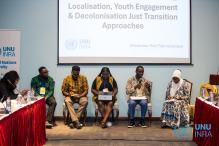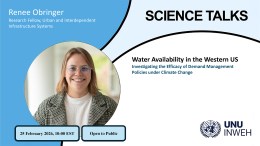Water security is central to addressing the challenges posed by climate change. Water insecurity is a significant pathway through which climate change impacts humanity. One in three Africans experiences water scarcity, with women, children, and other marginalized groups being disproportionately affected. Adapting to water scarcity fundamentally involves behaviour change. While behavioural and psychological sciences have contributed to understanding behaviour change, current insights are limited in Africa as they primarily draw from Western societies. This project aims to bridge that gap.
The Behavioural Adaptation for Water Security and Inclusion (BASIN) project seeks to leverage behavioural approaches to improve decision-making for more effective and equitable adaptation in policy and practice. The project's primary goal is to enhance the application of these behavioural approaches, recognizing that barriers and opportunities exist at multiple scales. The project will examine adaptation behaviours and practices from the individual level to systemic, organizational, and political levels. The aim is to foster water-secure behaviours and inclusivity and to develop and strengthen capacities for sustaining climate-resilient management and service provision.
UNU-INWEH is developing three online courses on EdX in the BASIN consortium for a Canada-UK Climate Adaptation and Resilience (CLARE) funded project to build and strengthen the capacity of water professionals to integrate or enhance behavioural approaches. The three courses will provide an overview of technical evidence and guidance from case studies in Burkina Faso, Tanzania, and Malawi for supporting water professionals in designing, implementing, and evaluating water security and inclusive behaviour programming. Learners should be able to address the following learning objectives upon completing the courses:
- Map, identify, and facilitate targeted water security and inclusive behaviours in different contexts and scales (policy, institutional, community, individual) to adapt and build climate resilience.
- Who should perform these behaviours, accounting also for where and when.
- Map and identify environmental (including social and institutional) drivers and barriers influencing behaviour cessation, adaptation, uptake and/or maintenance, and greater inclusion, especially of women and girls.
- Use frameworks and tools to develop behavioural objectives and indicators (including gender, equity, and inclusion (GEI) considerations), design and implement interventions and assess success.
- The courses should especially account for the specialist knowledge and resource limitations of community-based organizations and local water basins or water authorities focused on building water-related climate resilience in Sub-Saharan Africa.
Related Publications:
Conway, D. (2024). Water on the mind: Mapping behavioural and psychological research on water security. WIREs Water, e1755. https://doi.org/10.1002/wat2.1755
Blog (March 2024) Water security in Africa is gender dependent | Africa at LSE
Project Partners:
Grantham Research Institute, London School of Economics (GRI-LSE) and the Department of Psychological and Behavioural Science
WaterAid
Water Witness International
Shahidi wa Maji (SwM)
University of Malawi (UoM)
Kulima Integrated Development Solutions, South Africa (Kulima)
Nelson Mandela African Institution of Science and Technology (NMAIST)




